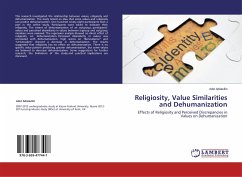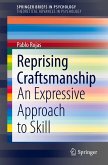This research investigated the relationship between values, religiosity and dehumanization. The study tested an idea that some values and religiosity can predict dehumanization. One hundred ninety eight participants took a part in the online study. Participants were asked to evaluate their religiosity. The extent of dehumanization of an outgroup, participants' values and perceived dissimilarity in values between ingroup and outgroup members were assessed. The regression analysis showed no direct effect of religiosity on dehumanization. Perceived dissimilarity in values was correlated with dehumanization. High scores on "Benevolence" and "Universalism" showed a decrease in dehumanization. The results suggested that religiosity has no effect on dehumanization. There is no specific value pattern predicting greater dehumanization, but some values are believed to decrease dehumanization. Some suggestions for further research, the limitations of the study and practical implications arediscussed.








